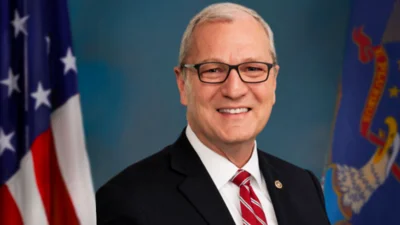Senator Kevin Cramer | Senator Kevin Cramer Official website
Senator Kevin Cramer | Senator Kevin Cramer Official website
WASHINGTON – U.S. Senator Kevin Cramer (R-ND), member of the Environment and Public Works (EPW) Committee, joined Ranking Member Shelley Moore Capito (R-WV) in introducing legislation to substantively reform the nation’s broken permitting and environmental review processes.
The Revitalizing the Economy by Simplifying Timelines and Assuring Regulatory Transparency (RESTART) Act covers key reforms under EPW’s jurisdiction. Senator John Barrasso (R-WY), Ranking Member of the Energy and Natural Resources (ENR) Committee, is leading a separate package related to ENR’s jurisdiction. Together, the bills work in lock step to fix the outdated permitting laws delaying energy, infrastructure, transportation, and other projects across America.
“We don't need more government; we need smarter government. We don't need more regulators; we need fewer regulations. We don't need endless litigation; we need responsible oversight without reflexively killing critical infrastructure projects,” said Senator Cramer. “The RESTART Act addresses underlying issues in our environmental statutes and presents the clearest option for permitting reform. North Dakota has a lot to contribute to this discussion, and in my capacity on EPW, I look forward to bringing some of our state’s excellence and common sense to the negotiating table.”
Senator Cramer is a strong proponent of permitting reforms. He previously engaged in bipartisan permitting reform negotiations, though voted against the final bill, as it would have federalized electricity transmission siting and socialized costs without defined guardrails for who pays. Earlier this Congress, the Senator joined Axios for a fireside chat on energy and environment issues, including permitting outlook. Most recently, he delivered remarks to emphasize the importance of maintaining states’ authorities over transmission systems, a priority he reiterated at last week’s EPW hearing.
Among other things, the RESTART Act would:
- Learn from North Dakota’s experience with the Dakota Access Pipeline by ensuring legal certainty for fully permitted and operational projects
- Improve timeline efficiency as follows:
- 60 days for filing NEPA claims and 180 days for courts to issue final judgements
- One (1) year for Environmental Assessments; Findings of No Significant Impact; final action relating to Section 401 permitting under the Federal Water Pollution Control Act
- Two (2) years for Environmental Impact Statements
- Codify key policies like the Navigable Waters Protection Rule and Nationwide Permit 12 rules
- Prevent onerous practices like judicial reviews of records of decision on operational projects, as well as use of the “Social Cost of Greenhouse Gases” metric
- Minimize duplication by mandating there be a lead agency on every permitting process and requiring National Environmental Policy Act (NEPA) authorizations reference a single environmental document and joint record of decision
- Amend the Endangered Species Act (ESA) to shorten consultation timelines from 90 to 60 days and establish a program for qualified state agencies to take on Section 7 ESA consultations
- Clarify ambiguities by:
- Reducing requirements for new source review permits on stationary emissions if modifications either lower emissions, or aim to restore, maintain, or increase safety
- Specifying Section 401 claims pertain to water quality standards
Senators Cramer and Capito are joined by Senator John Barrasso (R-WY) and every EPW Republican: Cynthia Lummis (R-WY); Markwayne Mullin (R-OK); Pete Ricketts (R-NE); John Boozman (R-AR); Roger Wicker (R-MS); Dan Sullivan (R-AK); and Lindsey Graham (R-SC).
Original source can be found here.





 Alerts Sign-up
Alerts Sign-up